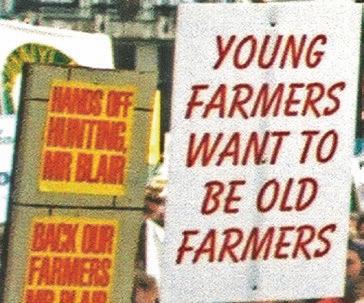
2 minute read
COUNTRYSIDE
ON 22nd September 2001, Foot and Mouth case number 2026 was confirmed at Kirkby Stephen in Cumbria. Exactly one year later over 407,791 country people marched through London’s streets in Britain’s biggest ever civil liberties protest.
The aim was to show the Government the dis-satisfaction felt in rural Britain over a wide range of issues. It was not politically motivated, but fuelled by a passionate care and concern for the British countryside.
The Government’s proposed ban on foxhunting in England had lit the fuse, prompting thousands of busloads and hundreds of trainloads of people, of all shapes, sizes, ages and bank balances, to trek to the capital from all across Britain.
Farming concerns
Placards carried by marchers showed concerns went much deeper than the proposed demise of a traditional country sport. The farming community, the economic lifeblood of rural Britain, had serious concerns for the future of rural communities and the entire British countryside.

Foot and Mouth had marked a watershed. For many who suffered either directly or in-directly the March was an emotional bloodletting after the dismay at the Government’s determination to evade important questions about the handling of the disease.
But while Foot and Mouth was in the past, it was (and still is) the present and future that concerned Britain’s farmers.
The Government had a highly productive red tape factory, suppressing and complicating agricultural progress, while cheap foreign food from unmonitored systems, often dubiously labelled, elbowed British food aside on the shelves.
Farm livestock had less freedom of movement than tagged criminals, and humans using public transport received less consideration and comfort than animals on livestock lorries.
Rural infrastructure already bore negative scars, with rural health facilities, law enforcement, schools, post offices and transport amongst the casualties.
For me, the journey to the March started in Perthshire on September 21st, driving south to join my family who farm in Herefordshire. From there we congregated at Ross on Wye livestock market to board one of the buses booked to take us to London.
Unsure as to how our expedition would turn out, we set off quietly from the market, which was still suffering the aftermath of Foot and Mouth; its catchment area had been almost swept clear of livestock.
London would be easy!
Our first comfort stop on the M4 Motorway signalled what was to come. There was barely enough space to park between the mass of coaches from rural Wales and the border counties. The loo queue stretched far across the coach park. We had over-whelmed a Motorway service station. London would be easy!
Arriving at Hyde Park we joined the Liberty section of the March. As each new bus load joined, with banners aloft giving the name of their region and explaining their concerns, a hero’s welcome was given.
Where were the “red coated toffs shouting Tallyho” and “the contorted faces” we had heard so much about from the Government? Not one red coat, and the faces were those of honest, decent, hard-working country folk.








